Overview
- Automotive was the most intimate industry in the U.S. in 2017, slipping to #2 in 2018 behind media & entertainment.
- In the 2018 Brand Intimacy Study, Jeep showed the most significant improvement in the industry, jumping from #15 overall to #4.
- Jeep has the second highest percentage of customers in the strongest stage of Brand Intimacy, the fusing stage.
- Among other things, Jeep has been successful in its marketing efforts by leveraging emotion, empowering brand evangelists, and being relevant to younger generations.
For generations, the automotive industry has been home to some of the world’s most beloved brands. While this remains true today, our 2018 Brand Intimacy Study shows the industry has slipped slightly from its #1 position in the U.S. to make room for media & entertainment. While automotive is still the second-most-intimate industry, we’ve seen some dips in performance from some of its top brands, especially in the case of Harley-Davidson, which dropped from being the industry leader and the #3 brand overall to being the #5 automotive brand and #18 in the study. The industry has also shown its first sales slowdown in seven years, with a decline of 1.8 percent in cars and light trucks sold in 2017.1
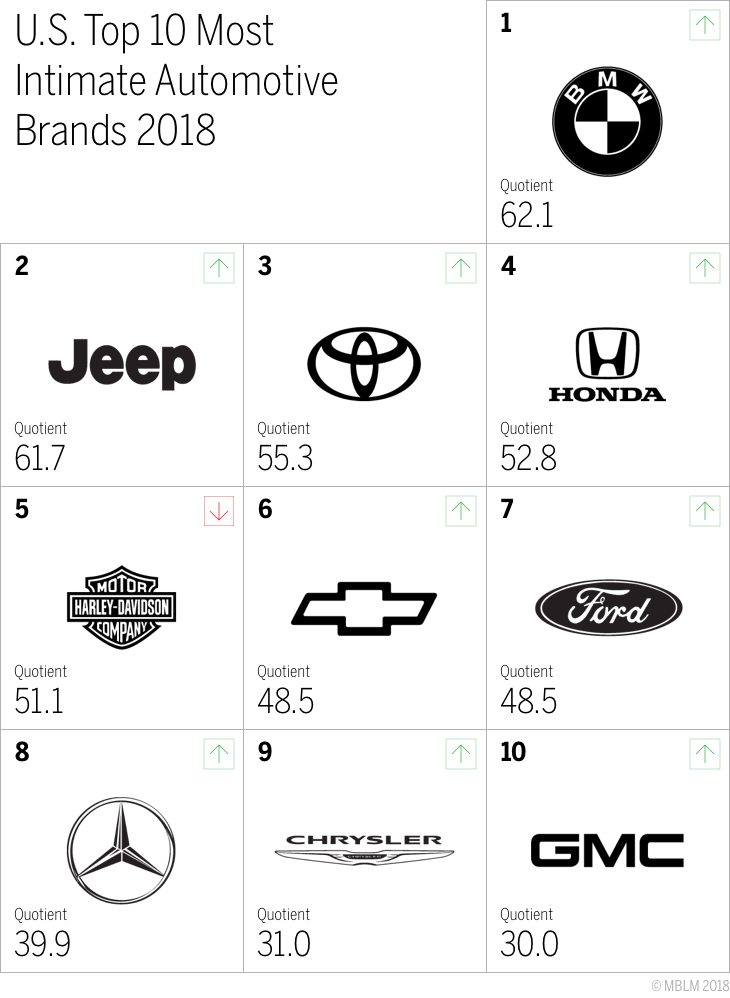
Of all the brands in this category, Jeep has shown the most impressive year-over-year performance. Jumping from #15 to #4 overall, Jeep has increased its Brand Intimacy Quotient by 8.3, from 53.4 to 61.7, becoming the #2 automotive brand, surpassing Harley-Davidson, Toyota, and Honda in the process. In addition to climbing the ranks, Jeep has increased its scores for each of the six Brand Intimacy archetypes, which are patterns or markers that identify the character and nature of ultimate brand relationships. Of these archetypes, Jeep saw notable jumps in nostalgia (focusing on warm feelings associated with memories of the past), ritual (becoming ingrained in a person’s daily actions), and indulgence (centering on moments of pampering and gratification). The brand has also increased its percentage of customers in the highest stage of Brand Intimacy, fusing, making it #2 in the study for this stage behind only Apple.
Percentage of fusing customers by automotive brand
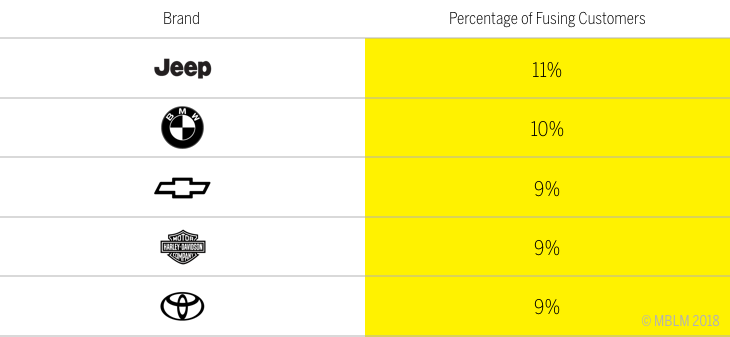
Jeep is an iconic vehicle with strong ties to patriotism, recreation, and exploration, so it has considerable opportunities to build strong emotional bonds. But why was Jeep especially successful at building Brand Intimacy in 2017? We decided to look back at the brand’s most memorable moments of the past year and see what Jeep has been doing and how it’s managed to improve its intimate brand relationships.
1. Showcasing the strong, emotional core of the brand
From its popularity as an off-roading vehicle to its role in American history, almost everything about Jeep goes back to a few powerful ideas. As its website says, “For over 75 years the Jeep® Brand has been indelibly linked to freedom, adventure, authenticity and passion.”2 In 2018, this certainly feels true, especially when watching “Freedom and Adventure,” Jeep’s 2017 one-minute television advertisement, in which a male, grizzly voiced personification of the brand narrates its life story, starting with its mother and father, Freedom and Adventure, respectively. Showcasing the 2018 Wrangler, the ad uses footage of Jeeps throughout the years and colorful language to capture the ideas of Freedom and Adventure, associating the two with rebellion, fun, nonchalance, experience, and, of course, authenticity and passion. These associations in themselves are quintessential American values.
“Freedom and Adventure” not only leverages the core, emotional elements of the brand, it does so in a way that feels true and authentic. The personality of the voiceover is backed up by the imagery of mud-soaked Wranglers and desert road trips and reminiscent of the brand’s slogan, “Go Anywhere. Do Anything.” Jeep adds to the emotional richness of its brand with this ad by making a meaningful statement about its values in a way that invites audiences to come along and be part of the ride.
This idea was echoed in a comment from Olivier François, Chief Marketing Officer, FCA U.S., who told us, “Breathing actual life into two of the brand’s core attributes (‘Freedom & Adventure’) by positioning them as ‘Mom & Dad’ added an emotional lens that ties consumers directly to the brand. It allows audiences to feel that sense of adventure, to feel that sense of freedom.”
2. Not being afraid to go against the grain
For being such an essential American brand, Jeep can be a bit of a contrarian. So much about the brand’s messaging is about carving your own path, doing your own thing, and not being confined to the limits of the road (watch “The Road” for more on this). As we’ve seen before in other categories, going against the grain can send a strong message to consumers and be a powerful device of differentiation. This was certainly the case with Jeep’s “Anti-Manifesto,” a one-minute television ad that flies in the face of car commercials that use “big declarations making claims to some overarching human truth,” as a Jeep Wrangler impressively traverses a lake and climbs to the top of a rock formation. The voiceover concludes with a playfully irreverent line, “There’s your manifesto.”
“Anti-Manifesto” mocks a widely used marketing practice to set Jeep apart from the rest of the industry. By showing what the product can do in lieu of a traditional manifesto, which typically describes a brand’s connection to a higher purpose or meaning, Jeep embodies one of its core values: authenticity. It shows consumers who it is without sounding contrived or pretentious, and like in “Freedom and Adventure,” the brand’s claim here is easy to get on board with because it’s made with a flare of personality and a sense of humor. By going against the grain of the slick car ads audiences have become accustomed to, Jeep shows that its brand is about something more real than luxury or style.
3. Using evangelists to spread the gospel
Social media is an essential marketing tool for the modern brand. Consumers now have power to voice their feelings about the brands they love or hate, and brands have the power to reach out and connect with their customers, creating a valuable opportunity for dialogue and reciprocity. Jeep’s #myjeepstory campaign is an example of interactive social media done right. The brand invited owners and fans to share the stories of their relationships with Jeep on social media using the hashtag #myjeepstory. Jeep then collected their favorite submissions and created one- to three-minute videos of Jeep fans telling their stories. Every story details a strong connection between the person and the brand, explaining what Jeep means to them.
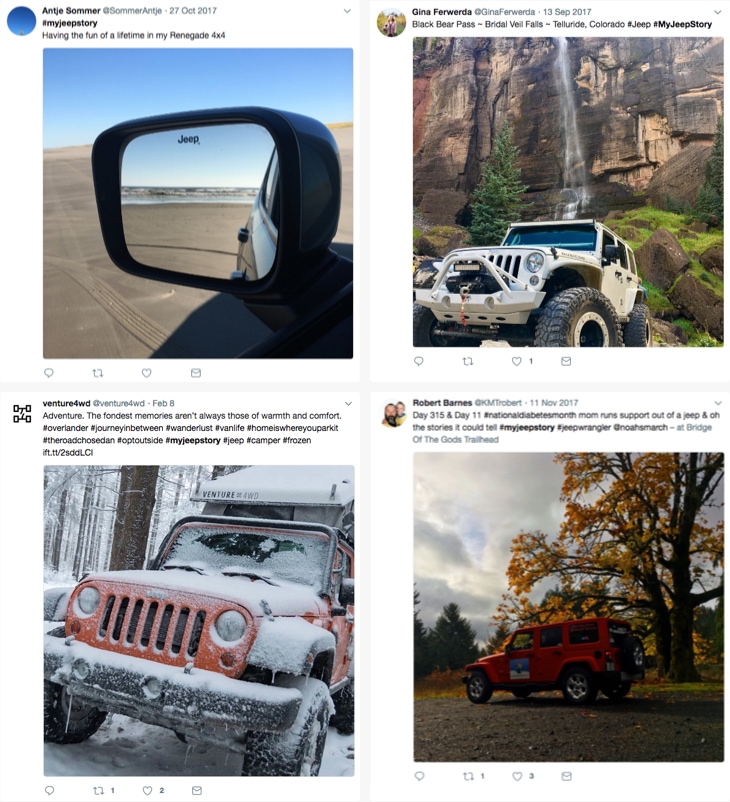
The #myjeepstory videos leverage some of the strongest emotional connections the brand has built and shares these connections with a much wider audience, all while strengthening the relationship Jeep has with their storytellers. These storytellers are likely to be highly intimate customers whose bonds with Jeep are solidified further by appearing in these videos. The campaign encourages participation, highlights emotion, and gives customers ownership of the brand with the line “We don’t make Jeep®, you do.” Jeep’s strong connection with its most devoted customers is evidenced in the data from our Brand Intimacy Study, which shows that Jeep is #2 in the study for percentage of users in the highest stage of Brand Intimacy, fusing, with 11 percent (up from 8 percent last year). The #myjeepstory campaign honors the relationships of these highly intimate users while sharing them with the rest of the world and giving a voice to Jeep’s most passionate advocates.
Stages of Brand Intimacy
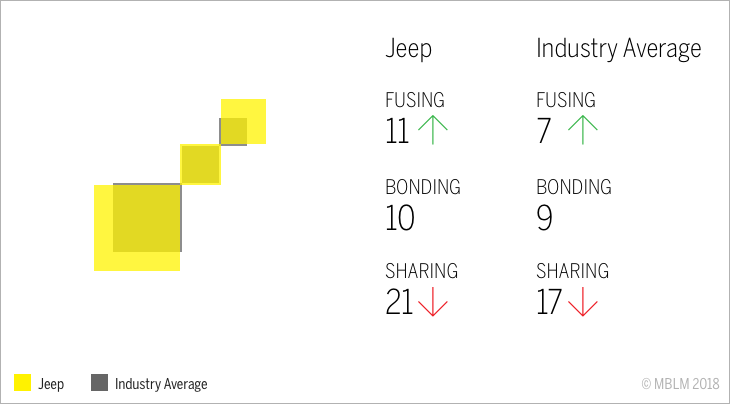
Jeep further encourages its biggest fans by providing resources and events for their off-roading communities. Between the Easter Jeep Safari, a yearly event for four-wheeling enthusiasts, and the Badge of Honor app, a mobile resource with trail directions, information, and a point-earning system, Jeep is giving its admirers the tools to connect with one another and with the brand.
4. Leveraging nostalgia
Of the six Brand Intimacy archetypes, nostalgia is one of Jeep’s strongest. This means that nostalgia is an essential part of the connections that consumers form with Jeep, and this is no secret. The brand has long acknowledged its strong link to the past in its vehicle designs and advertisements and continues to do so, as evidenced by the World War II footage in “Freedom and Adventure” and this year’s “Jeep Jurassic.” Nostalgia is a powerful thing, and brands that have it on their side should use it wisely. Jeep does exactly that, leveraging its brand’s storied past without being left behind in the modern automotive landscape. These nostalgic nods to its history have resonated deeply with consumers, causing Jeep’s score for the nostalgia archetype to jump by fifteen points (nearly 50 percent) in 2018.
Brand Intimacy archetypes
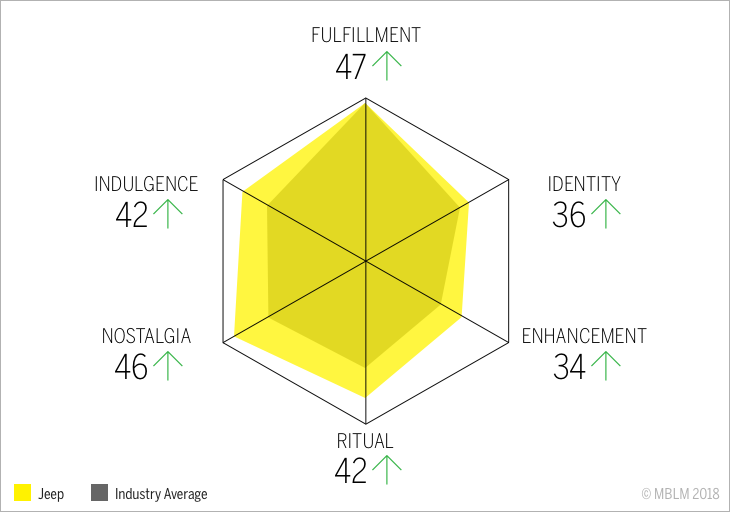
It’s not uncommon for an Americana brand like Jeep to have strong associations with nostalgia. For Levi’s and GAP, nostalgia is the dominant archetype, but while Levi’s and GAP’s ties to nostalgia seem to be international, Jeep’s appear to be more specific to America. Both Levi’s and GAP are ranking intimate brands in the U.S. and UAE, while Jeep ranks in the U.S. and Mexico. For the two apparel brands, nostalgia is the dominant archetype in both geographies, while for Jeep, it’s the second strongest in the U.S. and fifth strongest in Mexico. This could be because of the different ways apparel and automotive brands form bonds, but it is more likely a product of Jeep’s origin as a U.S. military vehicle. This doesn’t mean Jeep is unable to build Brand Intimacy in other countries (it ranks 68th in Mexico), but the fact that it’s a part of U.S. history makes its particular brand of nostalgia one that is inextricably tied to the U.S.
Jeep’s origin story also ties the brand to a strong sense of utility and no-frills performance, an association that might’ve contributed to its recent increase in Brand Intimacy. Today, U.S. consumers are buying fewer new cars and holding onto their currently owned vehicles for longer, with the average length of ownership hitting a record 79.3 months in 2017.3 This change likely reflects an increase in quality and a willingness to get more out of each vehicle, and Jeep is well positioned for this utility-oriented shift in the consumer mindset.
5. Appealing to women by not pandering to them
Women drive 70 to 80 percent of all consumer purchases, making them an invaluable demographic.4 In the automotive industry, the purchasing power of women is even stronger—women make 85 percent of car-buying decisions and buy 62 percent of all cars.5 Jeep performs significantly better with women than it does with men. In the 2018 Brand Intimacy Study, Jeep was the #1 automotive brand for women and the #4 brand for women overall. The brand does especially well with women over thirty-five, ranking #2 overall for this group.
If this seems surprising, it’s probably because Jeep doesn’t seem like a stereotypically feminine brand, but neither do the other brands in the Top 5 Most Intimate Brands for Women (Apple, Amazon, Disney, and Netflix). Also, research has shown that women tend to be more utility-minded than men when it comes to purchasing cars. Men are more image conscious, and as we’ve established, Jeep has strong associations with utility.6 Like other highly intimate brands, Jeep’s recent success with women can be at least partly attributed to the fact that its marketing efforts don’t appear to target only one specific gender and appeal strongly to both men and women. In the past year, Jeep’s “Release Your Renegade” campaign has been an example of the brand targeting women (and millennials) without pandering to traditional gender stereotypes. The commercials feature women artists describing what makes them renegades, sending a strong, empowering message about being yourself and speaking your mind.
6. Adapting the story for the next generation
Although Jeep’s story isn’t generation-specific, what resonates with baby boomers might not have the same impact with millennials or Generation Z. It’s important that Jeep’s core brand values stay intact, but telling the brand’s story in a way that speaks to the younger generation is essential. Jeep’s “Jeep Hair Don’t Care” Snapchat filter is a perfect example of the brand taking advantage of technology and popular social platforms to capture the fun, carefree personality of Jeep in a channel that younger audiences prefer. Created as a part of its “4×4 Day” campaign, the filter makes it look like the user is in a Jeep with his or her hair blowing in the wind.
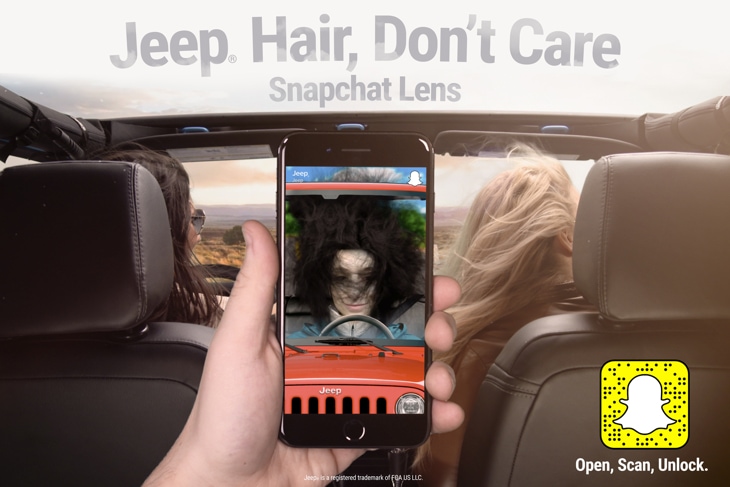
Although fun and lighthearted, it captures a part of what people love about Jeep in a modern medium (as did the filter from the year before, which simulated mud tracks). It casually reinforces who Jeep is and why consumers love the experience it provides us. Jeep is still most popular with older consumers though, ranking #2 overall for those thirty-five and over and #22 for those under thirty-five. But when compared to another iconic American automotive brand, Harley-Davidson, which didn’t rank with those under thirty-five, it’s clear that Jeep is ahead of the curve with the younger demographic.
Conclusion
Jeep’s marketing efforts this past year have endeared more consumers to its brand, strengthened its bonds with existing customers, and solidified its associations with its essential themes. The examples detailed above show how Jeep has been able to dimension the ideas of freedom, adventure, authenticity, and passion in new ways and leverage the power of emotion to add value to its brand.
Read our detailed methodology here, and review the sources cited in this article here.
To learn more about MBLM, click here.
